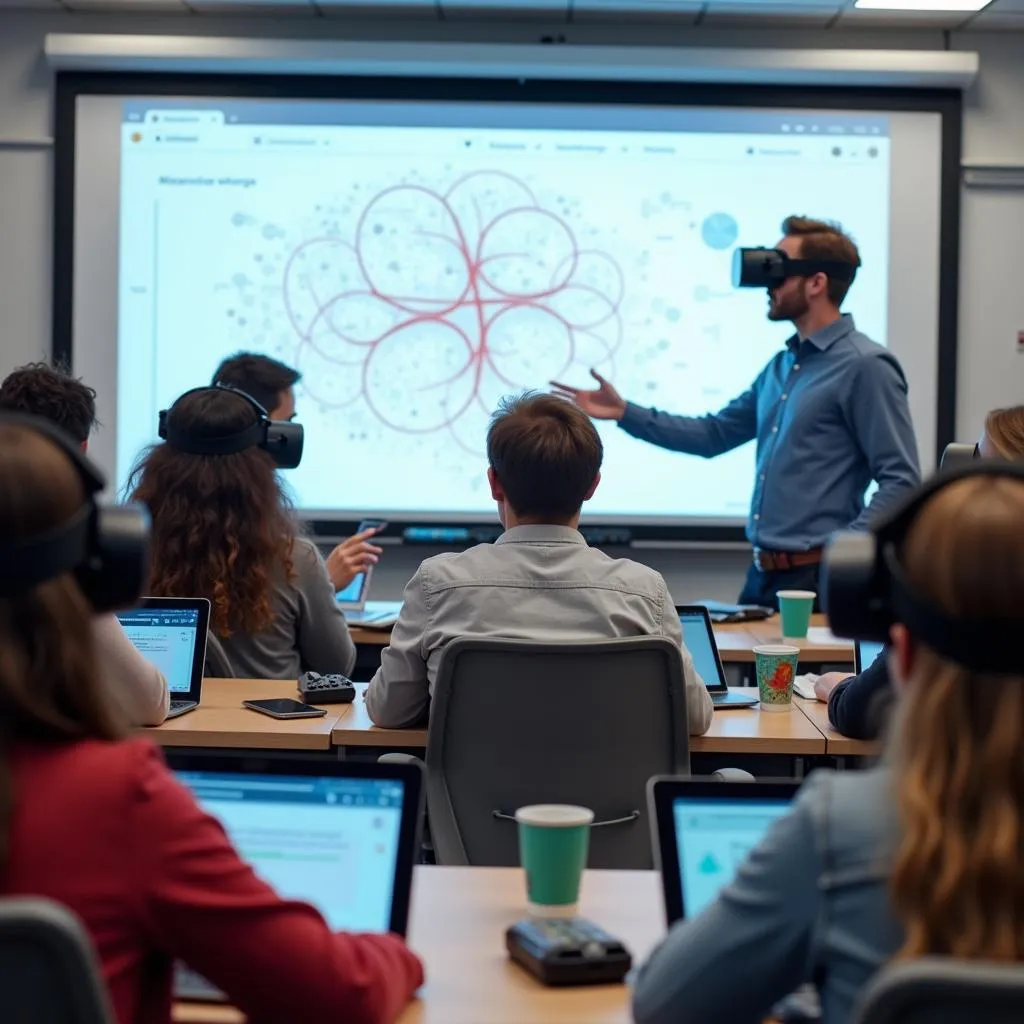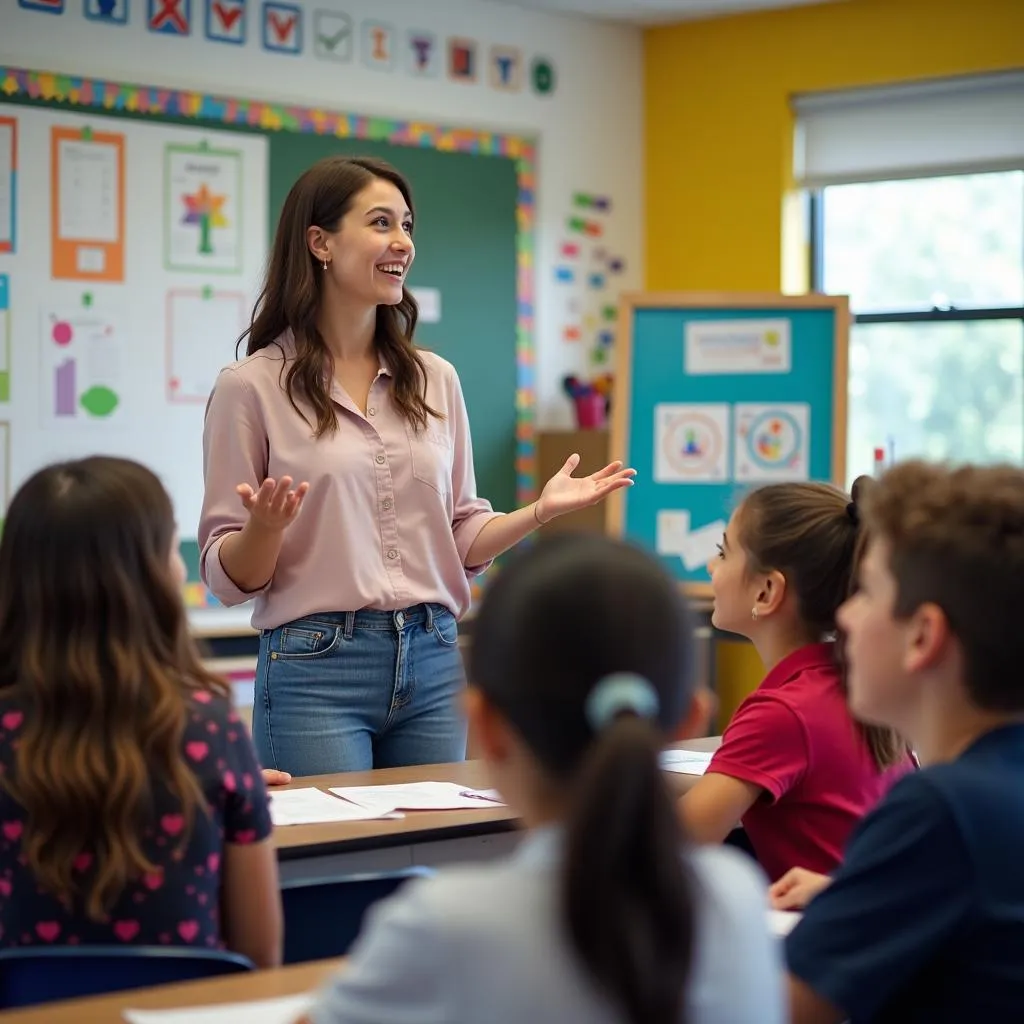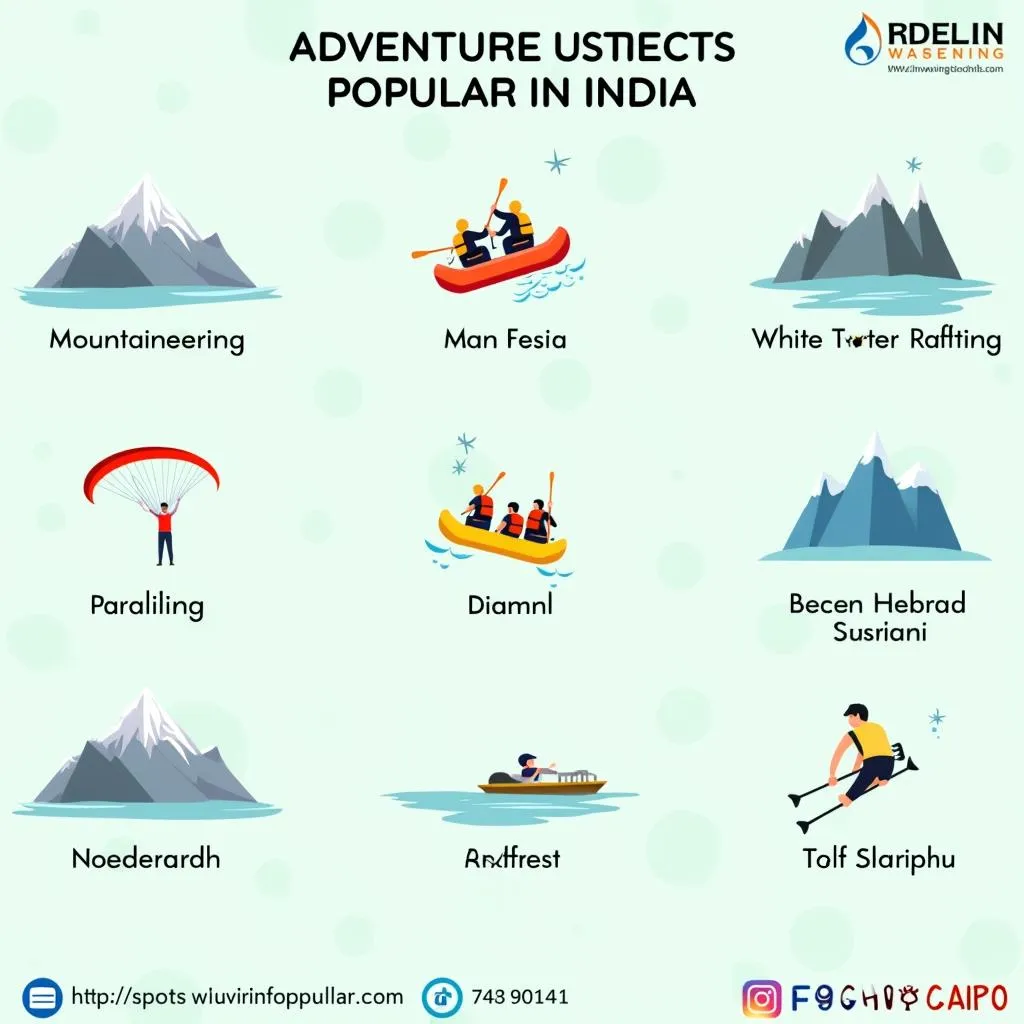Teaching others is a common experience that can provide valuable insights into our communication skills and ability to explain complex ideas. This topic frequently appears in IELTS Speaking tests, particularly in Part 2, where candidates are asked to describe a specific instance of teaching someone. Let’s explore how to approach this topic effectively to achieve a high score in your IELTS Speaking exam.
Nội dung bài viết
Part 1: Introduction and Interview
In Part 1, the examiner may ask general questions about teaching and learning. Here’s an example question with a suggested answer:
Examiner: Do you enjoy teaching others?
Sample answer (Band 7-8):
“Absolutely! I find teaching others to be incredibly rewarding. There’s something uniquely satisfying about sharing knowledge and seeing that moment of understanding light up someone’s face. It’s not always easy, but the challenge of breaking down complex ideas into digestible bits is something I genuinely enjoy. Plus, I often find that I learn a lot myself in the process of teaching others.”
Describe a time when you taught someone something can be a great opportunity to showcase your communication skills and ability to explain concepts clearly. Let’s move on to Part 2, where you’ll have the chance to elaborate on this topic in more detail.
Part 2: Long Turn
In this section, you’ll be given a cue card with a topic and some bullet points to guide your speech. Here’s an example:
Describe a time when you taught something to someone
You should say:
- Who you taught
- What you taught them
- How you taught it
- And explain why you decided to teach this personSample Answer (Band 6-7):
“I’d like to talk about a time when I taught my younger sister how to bake chocolate chip cookies. She’s always been interested in cooking, but baking was new to her. I decided to teach her because I wanted to share my passion for baking and spend some quality time with her.
I started by showing her the recipe and explaining each ingredient’s role. We then gathered all the necessary items and I demonstrated how to measure ingredients accurately. I guided her through each step, from creaming the butter and sugar to folding in the chocolate chips.
The most important part was teaching her to be patient and precise. I explained why each step mattered, like why we needed to chill the dough before baking. We also talked about the science behind baking, which she found fascinating.
By the end, she had successfully made her first batch of cookies. Seeing her pride and excitement made the whole experience worthwhile. It was a great bonding experience for us, and now we often bake together on weekends.”
Sample Answer (Band 8-9):
“I’d like to recount an experience where I had the opportunity to impart knowledge to my younger sister, specifically teaching her the art of baking chocolate chip cookies. As an avid baker myself, I saw this as a perfect chance to not only share my passion but also to foster a deeper connection with her.
The process began with a comprehensive overview of the recipe, delving into the nuances of each ingredient and its specific role in creating the perfect cookie. We meticulously gathered our supplies, and I demonstrated the importance of precision in measurement, emphasizing how even small variations can significantly affect the outcome.
Throughout the process, I consciously employed a hands-on approach, guiding her through each step with patience and encouragement. I found myself not just teaching the mechanics of baking, but also imparting valuable life skills such as attention to detail and the importance of following instructions.
One of the most enlightening aspects of this experience was explaining the science behind baking. We discussed concepts like the Maillard reaction and how gluten formation affects texture, which she found utterly captivating. This interdisciplinary approach not only enhanced her understanding of baking but also piqued her interest in chemistry and physics.
The culmination of our efforts resulted in her first successful batch of cookies. The palpable sense of accomplishment and joy on her face was incredibly rewarding. This experience transcended mere cooking instruction; it became a bonding ritual that we now cherish and regularly repeat. It reinforced my belief in the power of shared experiences and the profound impact that teaching can have, not just on the learner, but on the teacher as well.”
 Teaching baking skills to younger sister
Teaching baking skills to younger sister
Follow-up questions:
- How did you feel after teaching your sister?
- Do you think you’ll teach her other things in the future?
Sample answers:
Band 6-7:
-
“I felt really good after teaching my sister. It was nice to see her learn something new and enjoy it. I was proud of her and happy we could spend time together doing something fun.”
-
“Yes, I think I will. We both had a great time, and there are lots of other recipes I’d like to show her. Maybe next time we’ll try making a cake or some bread.”
Band 8-9:
-
“The experience left me feeling incredibly fulfilled. There’s a unique satisfaction in imparting knowledge and seeing it enthusiastically received. It also gave me a newfound appreciation for the art of teaching and how it can strengthen familial bonds.”
-
“Absolutely, I’m eagerly anticipating future opportunities to expand her culinary repertoire. This experience has opened up a new avenue for us to connect and grow together. I’m considering introducing her to more advanced baking techniques or perhaps branching out into international cuisines, which could be an excellent way to combine cooking skills with cultural education.”
Describe a person who motivates you to learn new things can be an interesting topic to explore in relation to teaching, as sometimes the person we teach can inspire us to continue learning and improving our own skills.
Part 3: Two-way Discussion
In this section, the examiner will ask more abstract questions related to the topic of teaching. Here are some potential questions and sample answers:
Examiner: Do you think everyone has the ability to teach?
Sample answer (Band 7-8):
“That’s an interesting question. I believe that while everyone has the potential to teach, not everyone may have the natural inclination or developed skills to do so effectively. Teaching requires a combination of patience, clear communication, and the ability to break down complex ideas into simpler parts. These are skills that can be cultivated over time, but they might come more naturally to some than others. Additionally, subject expertise is crucial, but it’s not the only factor. Someone might be brilliant in their field but struggle to convey that knowledge to others. Conversely, someone with strong interpersonal skills might excel at teaching even if they’re not the top expert in the subject. So, while I think the capacity to teach is universal, the effectiveness of teaching can vary greatly depending on individual traits and experiences.”
Examiner: How has technology changed the way people teach and learn?
Sample answer (Band 8-9):
“Technology has revolutionized the landscape of teaching and learning in myriad ways. Firstly, it has dramatically increased access to information and educational resources. With online platforms and massive open online courses (MOOCs), people can learn from experts around the world without geographical constraints. This democratization of knowledge has been truly transformative.
Moreover, technology has enabled more personalized learning experiences. Adaptive learning software can tailor content to individual students’ needs and learning paces, which is practically impossible in traditional classroom settings. Virtual and augmented reality technologies are also making immersive learning experiences possible, allowing students to interact with complex concepts in 3D environments.
However, it’s important to note that technology is not without its challenges in education. The digital divide still exists, and not all students have equal access to these technological resources. There’s also the issue of digital literacy – both teachers and students need to be proficient in using these tools effectively.
Despite these challenges, I believe the benefits far outweigh the drawbacks. Technology has made learning more interactive, engaging, and accessible. It has expanded the boundaries of what’s possible in education and continues to evolve, promising even more innovative teaching and learning methods in the future.”
 Technology-enhanced learning in modern classroom
Technology-enhanced learning in modern classroom
Describe a time when you worked with a team can be relevant when discussing teaching methods, as collaborative learning and group projects are becoming increasingly common in educational settings.
Key Vocabulary and Phrases for High Scores
To achieve a high score in IELTS Speaking, it’s crucial to use a variety of sophisticated vocabulary and complex sentence structures. Here are some key terms and phrases that can elevate your responses:
-
Impart knowledge /ɪmˈpɑːrt ˈnɒlɪdʒ/ (phrasal verb): To pass on or communicate information or skills.
Example: “As a teacher, my primary goal is to impart knowledge effectively to my students.” -
Foster /ˈfɒstər/ (verb): To encourage the development of something.
Example: “Good teachers foster a love of learning in their students.” -
Pique interest /piːk ˈɪntrəst/ (phrase): To stimulate curiosity or interest.
Example: “The interactive demonstration piqued the students’ interest in science.” -
Interdisciplinary /ˌɪntədɪsəˈplɪnəri/ (adjective): Involving two or more academic disciplines.
Example: “An interdisciplinary approach to teaching can help students see connections between different subjects.” -
Cultivate /ˈkʌltɪveɪt/ (verb): To develop or improve through education or training.
Example: “Effective teaching methods can cultivate critical thinking skills in students.”
Using these terms and phrases appropriately can demonstrate a high level of English proficiency and help you achieve a better score in your IELTS Speaking test.
Examiner’s Advice
To excel in the IELTS Speaking test, particularly when describing a teaching experience, consider the following tips:
- Be specific: Provide detailed examples and avoid vague statements.
- Use a variety of tenses: Demonstrate your ability to use different tenses accurately.
- Employ descriptive language: Use adjectives and adverbs to make your story more vivid.
- Show enthusiasm: Your tone and body language should convey genuine interest in the topic.
- Practice regularly: Familiarize yourself with common IELTS topics and practice speaking about them fluently.
Remember, the key to success in IELTS Speaking is not just about what you say, but how you say it. Confidence, fluency, and the ability to express complex ideas clearly are all crucial factors in achieving a high score.
Describe a person who has influenced your outlook on life can be an excellent topic to practice, as it allows you to demonstrate many of the same skills required when describing a teaching experience, such as providing specific details and using descriptive language.


